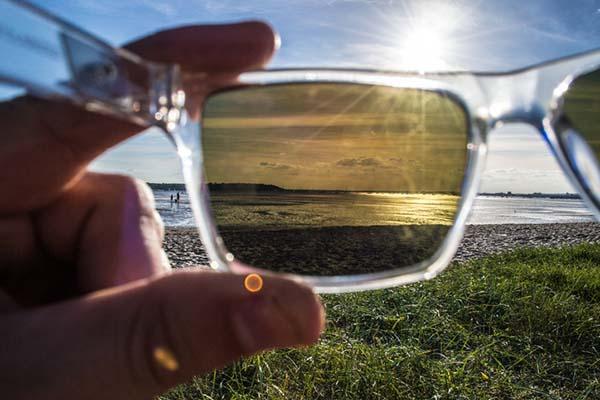Polarized sunglasses: Protecting your eyes from harmful glare
- Reviewed by Joan Miller, MD, Contributor; Editorial Advisory Board Member, Harvard Health Publishing

If you've shopped for sunglasses recently, you may have noticed that some of them feature polarized lenses. You may already know that it's important to buy sunglasses that protect against the sun's ultraviolet (UV) rays. But what are polarized sunglasses, and what do they offer that other sunglasses don't?
What are polarized sunglasses?
Polarized sunglasses are made with special lenses that reduce the glare caused by reflected light on horizontal surfaces like roads and bodies of water. Both nonprescription and prescription sunglasses can have polarized lenses.
You may not think of glare as hazardous, but in some cases it can be. For example, think about how glare impacts your vision when driving on a flat road on a bright, sunny day. Wearing polarized glasses minimizes glare, reduces eye strain, and can help you make out details more clearly.
How do polarized sunglasses work?
When sunlight hits an uneven surface, it scatters in multiple directions. This does not typically affect your ability to see clearly. But when light hits even surfaces — like a pond, a flat road, or a snow-covered ski slope on a sunny day — the light doesn't scatter. Instead, it is reflected in one direction, causing glare and reducing depth perception. You may even feel temporarily blinded by the light.
The chemicals used on polarized lenses filter reflected light so that not all the light passes through the lens. This makes it easier to see things clearly.
Benefits of polarized sunglasses
Polarized sunglasses are generally fine to wear as everyday sunglasses. They are ideal for activities and sports where you're likely to encounter glare from reflective surfaces, such as boating, fishing, skiing, and golf.
Polarized sunglasses are not ideal for looking at LCD screens, such as those on some cell phones, watches, and car dashboards. And they should not be worn while driving at night to reduce glare from oncoming vehicles. Although there are glasses claiming to improve vision for night driving, they may actually reduce vision since they reduce the amount of light reaching the eye.
It's important to note that polarized lenses alone do not protect against ultraviolet (UV) light from the sun. For that, you need to choose sunglasses that also offer UV protection. Also, not all sunglasses with UV protection are polarized.
Tips for buying polarized sunglasses
Here are a few things to consider when buying polarized sunglasses:
- Select your preferred tint. Polarized sunglasses are always tinted to some degree. Some are darker than others, but darker doesn't necessarily mean better.
- Go for larger lenses. The larger the lens, the greater the benefits of polarization.
- Protect your eyes from the sun's harmful rays. Check the label on polarized sunglasses to make sure they provide adequate UV protection.
About the Author

Christina Frank, Health Writer
About the Reviewer

Joan Miller, MD, Contributor; Editorial Advisory Board Member, Harvard Health Publishing
Disclaimer:
As a service to our readers, Harvard Health Publishing provides access to our library of archived content. Please note the date of last review or update on all articles.
No content on this site, regardless of date, should ever be used as a substitute for direct medical advice from your doctor or other qualified clinician.















